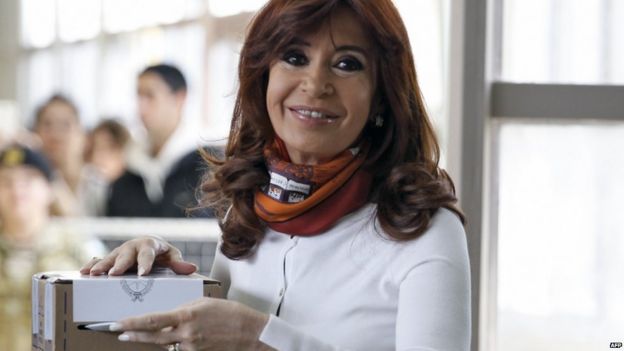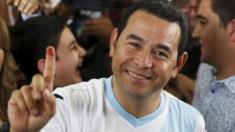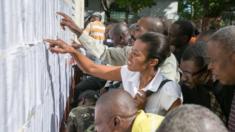Latin America & Caribbean
Argentina elections: November run-off looms in presidential race
- 2 hours ago
- Latin America & Caribbean
 AFP
AFP
Argentina will face a run-off election next month after neither presidential candidate gained enough votes to win the poll outright.
Centre-left candidate Daniel Scioli led exit polls, and just edged centre-right Buenos Aires mayor Mauricio Macri with most votes counted.
Many had expected Mr Scioli to lead by a greater margin.
The run-off on 22 November will be the first time an Argentine election will be decided by a second round.
With 86% of the votes counted, Mr Scioli was marginally ahead with 35.9% of the vote, while Mr Macri had 35.2%.
To win outright in the first round, a candidate needed 45% of the vote or a minimum of 40% as well as a 10-point lead over the nearest rival.
"What happened today will change politics in this country," Mr Macri, the mayor of Buenos Aires, told supporters.
 AFP
AFP
Mr Scioli was handpicked as candidate by two-term leader Cristina Fernandez de Kirchner, who is constitutionally barred from seeking a third term.
The governor of Buenos Aires province, he is a former world powerboating champion who lost his right arm in a race in 1989.
Late on Sunday, he spoke before thousands of his supporters, saying: "United together we will triumph. I call upon the undecided and independent voters to join this cause."
Last week, Mr Scioli pledged tax cuts for workers earning under a certain income, a move expected to affect half a million people.
He has also vowed to bring down Argentina's inflation to single digits in less than four years and promises to introduce policy changes to invigorate the economy.
Another candidate, Sergio Massa, a former ally of Ms Fernandez, was trailing in third place, ahead of three other names on the ballot paper, with 32m people eligible to vote.
At the scene: Wyre Davies, BBC News, Buenos Aires
As the polls closed, the hard-core Peronist party faithful and militant youth brigades began the night in noisy, celebratory mood at their election headquarters in Buenos Aires.
The only question, as far as they were concerned, was if Daniel Scioli would win outright in the first round, or if there would be a run-off vote. Several television channels had already declared Scioli the winner.
But when, six hours after counting began, the first results came in, few could believe them.
Mauricio Macri, a centre-right business friendly candidate, was neck-and-neck with Scioli - challenging and even defeating the powerful leftist movement that dominates Argentine politics.
As the Peronist militants packed their banners and trudged away, over at Mr Macri's headquarters they were jubilant mood. The two men will now go head-to-head in a November run-off - a contest in which no-one will now dare predict the outcome.
Ms Fernandez, who stands down after eight years in power, says she leaves Argentines a better country.
"We are voting today in a completely normal country," said Ms Fernandez said after casting her vote in the Patagonian town of Rio Gallegos.
In previous decades, Argentines always went to the polls "in the middle of a serious crisis," she added.
Ms Fernandez said achieving stability and leaving Argentines "a normal country" was the promise made by her late husband, Neston Kirchner, when he took office in 2003.
He died in 2010, three years after handing over the presidency to his wife.
Argentina's economic woes
14.5%
Official, but disputed, inflation level
- 28.2% the inflation level in 2014, according to the World Bank
- 0.7% amount IMF predicts the economy will shrink in 2016
AFP/Getty
Whoever wins the presidency faces significant economic challenges.
While the country gained strength after a financial crisis in 2002, its economy, the third-largest in Latin America, has slowed in recent years, with GDP growing by only 0.5% last year.
The government is also locked in a battle against American hedge funds who disagree with how it wants to restructure $100bn (£65bn) of debt on which it defaulted in 2001.
While the firms successfully sued Argentina for repayment, Ms Fernandez refused to pay.



No comments:
Post a Comment
Please leave a comment-- or suggestions, particularly of topics and places you'd like to see covered